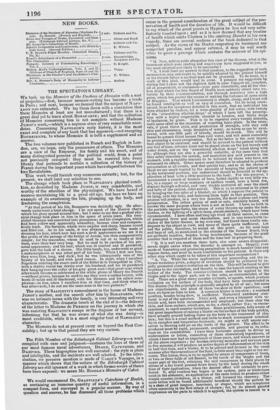NEW BOOKS.
Memoirs of the Duchess of Abrantes (Madame Ju- 12 voli.
not). By Herself. (French and English) Lives and Voyages of Drake, Cavendish. and Dam- 1 pier. (Edinburgh Cabinet Library, No. V.) Dr. Granville's Catechism of Health Jukes's Indigestion and Costiveness, with Hints to I both Sexes. (Second Edition.) C. B. Brown's Edgar Huntley. (Standard Novels, No. X.) Enerrs Adventures of a Dramatist 2 vols. The Chameleon Pompeii. (Library of Entertaining Knowledge.) Vol. I
Bishop Hall's Contemplations, Vols. I. and II 1
(Divines of Church of England. Parts 18 and 19) 1 Nicotiana, or the Smoker's and Snufftaker's Com- panion Rev. A. Broome's Duty of Humanity to Inferior 1 Creatures . ...... Author. Colburn and Co.
Oliver and Boyd. Colburn and Co. E. Wilson.
Colburn and Co.
Groombridge. Longman and Co.
C. Knight. Veiny.
E. Wilson.
THE SPECTATOR'S LIBRARY.
WE took up the Memoirs of the Duchess of Abrantes with a sort of prejudice,--first, because memoir-writing has become a trade in Paris ; and next, because we fancied that the subject of NAPO- LEON was exhausted. We lay them down with a conviction that these Memoirs at least are not manufactured ; that there is a great deal yet to learn about BONAPARTE ; and that the collection of Memoirs concerning him is not complete without Madame JUNOT'S work,—which is a copious store of very remarkable anec- dotes. Concerning NAPOLEON'S early history, it is the most exact and complete of any book that has appeared,—not excepting BOURRIENNE, to whose Memoirs it is both a supplement and an answer.
The two volumes now published in French and English in Lon- don, are, we hope, only the precursors of others. The Memoirs are a view of the Emperor, his family and his court, and of many distingushed persons of the political world, from a point not previously occupied : they must be received into every library that pretends to contain a collection of the history of France during the important years which have elapsed between the two Revolutions.
This work would furnish very numerous extracts; but, for the present, we shall limit our selection to one. The change which took place in NAPOLEON'S physical condi- tion, as described by Madame JUNOT, is very remarkable, and worthy of the attention of the physiologist. We have heard of success maintaining life to a great old age, but here we have an example of its sweetening the bile, plumping up the body, and freshening the complexion.
"At that period of his life, Bonaparte was decidedly ugly. He after- wards underwent a total change. I do not speak of the illusive charm which his glory spread around him ; but I mean to say that a gradual phy- sical change took place in him in the space of seven years. His ema- ciated thinness was converted into plumpness; and his complexion, which had been yellow and apparently unhealthy, became clear and compara- tively fresh. His features, which were angular and sharp, became round and filled out. As to his smile, it was always agreeable. The mode of dressing his hair, which now has such a droll appearance as we see it in the prints of the passage of the bridge of Arcola, was then comparatively simple; for the muscadins, whom he used to rail at so loudly at that time, wore their hair very long. But he used to be careless of his per- sonal appearance; and his hair, which was ill combed and ill powdered, gave him the look of a sloven. His little hands, too, underwent as great a metamorphosis as any other part of his body. When I first saw him, they were thin, long, and dark ; but he was subsequently vain of the beauty of his hands, and with good reason. In short, when I recollect Napoleon entering the court-yard of the Hotel de la Tranquillite in 1795, with a shabby round hat drawn over his forehead, and his ill-powdered hair hanging over the collar of his grey great-coat—that great-coat which afterwards became as celebrated as the white plume of Henry the Fourth —without gloves, because he used to say they were a useless luxury, with boots ill-made and ill-blackened, with his thinness and his sallow com- plexion—in fine, when I recollect him at that time, and think what he was afterwards, I do not see the same man in the two pictures."
The story of SALTCETTI'S concealment in the house of Madame JUNOT'S mother, and the search after him by BONAPARTE, who was on intimate terms with the family, is very interesting and very characteristic. The dramatic touch at the end of it—the delivery of the letter to Madame de PEamoN on the journey in which she was assisting SALICETTI'S escape in the disguise of her servant, informing her that he was aware of what she was doing—is most creditable, while it is a most singular trait of NAPOLEON'S character.
The Memoirs do not at present carry us beyond the First Con- sulship; but up to that period they are very curious.


























 Previous page
Previous page